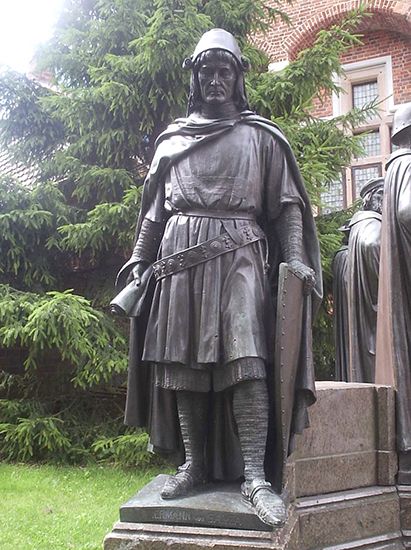Hermann Von Salza
- Born:
- c. 1170
- Died:
- March 20, 1239, Salerno [Italy]
Hermann Von Salza (born c. 1170—died March 20, 1239, Salerno [Italy]) was the German grand master (Hochmeister), from 1210 to 1239, of the organization of German crusaders called the Teutonic Order.
Born to a minor aristocratic family of Thuringia, Hermann had made his way by sheer ability to the powerful office of grand master of the Teutonic Order by 1210. He gradually earned the confidence and support of the Holy Roman emperor Frederick II (reigned 1220–50), whom he served as a diplomat and councillor. As grand master, Herman began to shift his order’s Christianizing and military activities away from the limited opportunities left in the Middle East in the wake of the failed late Crusades and toward the expanding pagan populations of eastern Europe. Hermann’s first enterprise, in Hungary, failed when the order was expelled from that region in 1225, but the order was soon afterward (1226) invited by Conrad of Mazovia to conquer and convert the Prussians in the region of the Vistula River. Hermann obtained a land grant in the region from Conrad, as well as a charter from Frederick II confirming the order’s mission and sovereignty among the Prussians. Hermann eventually (1233) initiated a general campaign for the conquest of Prussia under the direction of the provincial order leader Hermann Balk.
In 1230 Hermann von Salza played a key role in effecting a reconciliation between Frederick II and Pope Gregory IX, and in 1235 he helped resolve a conflict between Frederick and his rebellious eldest son, Henry. Trusted by pope and emperor alike, Hermann elevated the Teutonic Order to the height of its power; his farsighted policies enabled the order to create in Prussia a strong feudal state that would survive until the mid-15th century.










